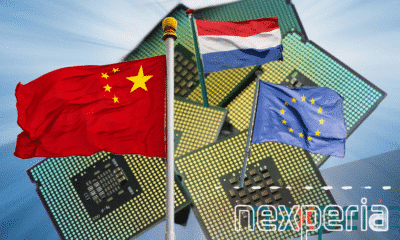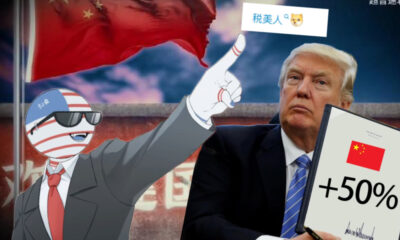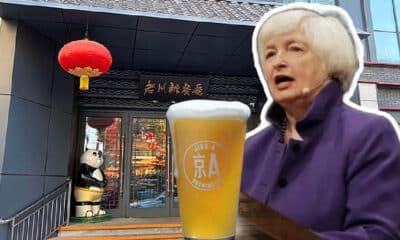China World
Frozen Europe and Fast-Changing China: Martin Jacques on the Sino-European Dilemma
Published
9 years agoon
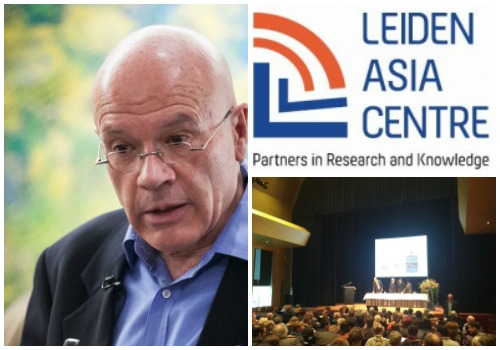
British journalist and scholar Martin Jacques speaks about current Sino-European relations as a keynote speaker at the opening conference of the Leiden Asia Centre. According to Jacques, the way Western media and politics are approaching China is deeply flawed – and it is causing Europe to miss the boat while China is marching forwards. Live blogged.
February 9th 2017 marks the much-anticipated opening conference of the Leiden Asia Centre, the expertise centre for socially relevant and applicable knowledge on modern East Asia based in the Netherlands.
The conference focuses on Sino-Dutch relations and the relations between Europe and China at large.
One of today’s key speakers is British journalist and scholar Martin Jacques (@martjacques), the author of the global best-seller When China Rules the World (2009). One of his key arguments is that China’s impact on the world goes beyond economics, and that it will also have extensive political, cultural and ideological consequences.
“China is looking for the ‘cracks’ in the global system; that where it is at its weakest.”
In introducing Martin Jacques, Professor Frank Pieke, one of the three academic directors of the Leiden Asia Centre, first talks about a separate “global China”, that is different from Western patterns of globalization.
China is looking for the “cracks” in the global system; that where it is at its weakest. Its presence is growing in Africa, Latin America, and also in regions like southern Europe. China is not looking for challenges, but it is looking for space, Pieke says.
One of the reasons why this is happening, Pieke argues, is that China is hamstrung by the fact that within its own region it is often perceived as a potentially hostile power by, for example, Japan or Korea. It does not have its own sphere of influence from where it can expand into the world.
“China is not ‘like us.’ It has never been and it will never be.”
Martin Jacques agrees with Pieke in the sense that “China’s globalization” is different from “globalization” as it is often perceived in the West.
There is a fundamental problem with how China is framed and discussed in western media, politics and academia, Jacques argues, as it often come down to the idea that China should be ‘like us.’
“We are the ‘global leaders’ and we supposedly define what modernity is, and modernity is singular. And therefore modernisation is westernization, and therefore China will end up just like us. Well, this is complete rubbish,” Jacques says: “China is not ‘like us.’ It has never been and it will never be.”
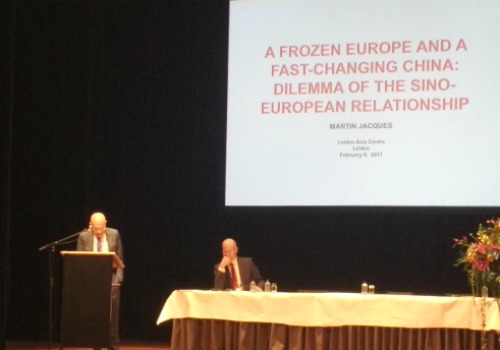
Jacques stresses that the concept of ‘modernity’ is plural, and that there is not one modernity because it is not shaped in neo-liberal terms, but it is shaped by history and culture. And since China’s history and culture is profoundly different from that of any Western country, we have to understand China in its own terms – not in our terms. The main reason why Western media or politics got China “so wrong” in the last decennia, Jacques argues, is because they failed to do this.
The assumptions people have about China are therefore generally flawed, and have failed to predict how China would evolve in the future.
China is not a nation state, but a ‘civilization-state’, and is very different from any European nation state. It is a huge united country – and the fact that it is stable and unified is the country’s top priority. The key political values of the Chinese are influenced by this idea, and also fundamentally different from Europe.
Why China is politically never going to be the same as Europe is because its key political concepts of unity, stability, and order, based on its long history, are what have shaped and are shaping China.
“China has not followed anyone’s route, but has chosen its own.”
China has not followed anyone’s route, but has chosen its own, Jacques argues. “The idea that Chinese governance is going to be like Western governance is profoundly mistaken. China is not going in that direction. I am not saying they will not change – there have been large changes already – but it will change in its own ways.”
China is historically also very different from Europe in the sense that it has not colonized the way Europe has, and has been less aggressive.
“Consider that China from being dirt poor is becoming the world’s second economy, and this all in a relatively peaceful process.”
Jacques emphasizes that China is in the process of transforming the world. Not only due to its size, but also due to its difference, that is bound to going to project itself and bring its history, values, and traditions to the rest of the world.
“China is not the leader of globalization, but it is certainly true to say that China is shaping globalization profoundly.”
All discourse about China’s rise has always been economic – discussed within the framework of American hegemony. But Jacques wants to stress that the rise of China goes much further than economics alone: 1.4 billion people are in the process of transformation is all sorts of ways, which is impacting China and the world in numerous ways.
Jacques notes that China has sometimes been blamed for being a ‘free rider’ in the international society, or for not ‘contributing’ anything, but this is changing. Since Xi Jinping has risen to power there have been some extraordinary initiatives, such as the Asian Infrastructure Investment Bank. Jacques predicts that also through these kinds of initiatives, its influence is growing, and that those ever said China is not ‘contributing’ will be biting their tongues.
“It is not true to say China is the leader of globalization, but it is certainly true to say that China is shaping globalization profoundly.”
Jacques is pessimistic about the prospect of Sino-European relations. China is going ahead, and Europe is basically “stuck”, as it is increasingly turned inwards.
“Tencent, Alibaba, Huawei, Baidu, JD.com, Xiaomi, and other tech companies show that in many ways China is now ahead of Silicon Valley.”
Lastly, Jacques addresses the importance of China as a global power and crucial global influencer in various ways.
China’s online growth has shown it is the global leader in terms of internet commerce. Tencent, Alibaba, Huawei, Baidu, JD.com, Xiaomi, and other tech companies show that in many ways China is now ahead of Silicon Valley, with China’s online sales being well ahead of those in countries like the USA. Jacques also mentions that the functionality of apps like Weixin/WeChat is more advanced than its western counterpart Whatsapp – meaning that ‘the world’ will also be looking at China when it comes to its digital developments.
The country is also moving quickly in other ways. China is also the leader when it comes to issues such as climate change and foreign investments. He also mentions the ‘One Belt, One Road’ project (“it’s probably going to be extremely important.”)
“If Europe can’t hitch a ride with China in its transformation, then it will become marginalized.”
There is one last thing Martin Jacques wants to add to his speech, and it is about Trump, whom he calls “the most frightening president the US has ever had”, and how he will change the EU-USA-China dynamics.
Under Trump, he said, America will look after its own interests and will interact with the rest of the world in terms of bilateral relationships rather than from a plural, global position.
What will the Chinese do? “They will retaliate,” Jacques says. As China-US relations deteriorate, with China pushing America back, they will deepen the agreements with their own neighbors. The One Belt, One Road is an important part of this strategy.
Jacques foresees that the rise of Trump will also change Sino-European relations, as Europe -like China- also has little interest in Trump.
“I started off by saying Europe and China are very different, which is true,” he says. But despite his somewhat pessimistic views on Sino-European relations that find its roots in the western frameworks applied to China, there is also some light at the end of the tunnel: “Unlike the USA, both Europe and China have a long history. And there has been little rivalry with China. There is a logic for Europe to move much closer to China.”
Jacques stresses the importance for Europe to keep up with China. It is not China that needs to change, he argues – Europe does.
“China will keep marching on. China will keep its dynamic transformation. It will continue to grow. China is not the problem. Europe is. And we need to face up to that. If we can’t hitch a ride with China in its transformation, then we will become marginalized.”
Liveblog ended
– By Manya Koetse
Follow on Twitter or Like on Facebook
What’s on Weibo is an independent blog. Want to donate? You can do so here.
[showad block=1]
©2017 Whatsonweibo. All rights reserved. Do not reproduce our content without permission – you can contact us at info@whatsonweibo.com
Manya is the founder and editor-in-chief of What's on Weibo, offering independent analysis of social trends, online media, and digital culture in China for over a decade. Subscribe to gain access to content, including the Weibo Watch newsletter, which provides deeper insights into the China trends that matter. More about Manya at manyakoetse.com or follow on X.

China Memes & Viral
Trump and Takaichi: The Unexpected Love Affair
The meeting between US President Donald Trump and new Japanese Prime Minister Sanae Takaichi became a popular topic on China social media, thanks to a stream of meme-worthy moments.
Published
3 weeks agoon
November 2, 2025
It was a pleasant autumn day in Tokyo on October 28, when Trump first met Japan’s newly-elected Prime Minister Sanae Takaichi (高市早苗).
Takaichi welcomed Trump at the State Guest House as her first foreign guest since taking office as Japan’s first-ever female leader, offering what Yomiuri Shimbun described as “Takaichi-style hospitality.”
During the visit, Trump and Takaichi held a bilateral summit during which Takaichi expressed desire to build a new “golden age” for the US-Japan alliance. Afterwards, they signed agreements and exchanged gifts — a golf bag for Trump, signed by Japanese golf star Hideki Matsuyama (with whom Trump has previously played), and “Japan is Back” baseball caps for Takaichi.
Following a lunch that featured Japanese vegetables and American steak, the two visited the US Navy’s Yokosuka base, where Trump remarked that he and Takaichi had “become very close friends all of a sudden.”
On Chinese social media, the meeting drew considerable attention.
There has been heightened focus in China on Sanae Takaichi beyond anti-Japanese sentiment and her recent appointment as Japan’s first female Prime Minister — as she is widely regarded as a far-right politician who denies, downplays, or glorifies historical facts related to the Second Sino-Japanese War (1931-1945).
Japan’s official narrative of its wartime past has long been a major obstacle to deeper reconciliation between China and Japan, and it is highly unlikely that Takaichi’s views of the war are going to bring China and Japan any closer. Among others, she is known for visiting Yasukuni Shrine, the Tokyo shrine that honors Japan’s war dead (including those who committed war crimes in China). She also claimed that Japan’s aggression following the Manchurian Incident, which led to the outbreak of the Second Sino-Japanese War, was an act of “self-defense.”
In light of these tensions in Sino-Japanese relations, and because of the changing dynamics in the current US-China relationship, many details surrounding the Trump–Takaichi meeting became popular talking points.
🔴 Trump: Reaffirming US Dominance, Insensitive to Japan’s Wartime Past
Many netizens focused on moments they interpreted as Trump asserting dominance or showing disregard for Japan.
👉 One awkward moment showed how, during the welcoming ceremony, Takaichi failed to properly escort the US president. He walked ahead of her twice, and, despite the cues to salute the Japanese flag, Trump simply walked past it instead, leaving Takaichi looking visibly surprised (video).
While some saw it as a case of poor etiquette instructions behind the scenes, most reactions framed it as a sign of power dynamics in the US–Japan relationship, with some commenting: “Why would the master bow to his son?” (Hashtags: “Trump Skips the Japanese Flag” #特朗普略过日本国旗# and “Trump Ignores Takaichi Twice in a Minute” #特朗普1分钟内两次无视高市早苗#)
👉 Another widely discussed moment came at the Yokosuka base, where Trump invited Takaichi on stage and mentioned how their bond was based on WWII (“Born out of the ashes of a terrible war”) — a comment that seemed to catch Takaichi off guard (video). He quickly followed up with, “our bond has grown into the beautiful friendship that we have,” but not before her expression visibly changed.
Under the hashtag “Trump’s Remark Gave Takaichi a Scare” (#专家:#特朗普一句话吓了高市早苗一大跳#), Chinese media outlet Beijing Time (@北京时间) commented: “She was afraid that Trump might go on to say something she couldn’t respond to easily.”

Image by online creator.
👉 Later, at a reception at the US Embassy in Tokyo, Trump referred to the Pacific War as a “little conflict.” While the euphemism may have been aimed at promoting reconciliation (“We once had a little conflict with Japan — you may have heard about that — but after such a terrible event, our two nations have become the closest of friends and partners…” video), many Chinese netizens and outlets, including The Observer (观察者网) interpreted the remark as dismissive. This fueled hashtags like “Trump Calls the Pacific War a Small Conflict” (#特朗普将太平洋战争称作小冲突#) and “Trump Refers to Hiroshima and Nagasaki Bombing as a Small Conflict” (#特朗普称轰炸广岛长崎只是小冲突#).
🔴 Takaichi: Smiles & Body Language Seen as Deferential to US
Alongside critiques of Trump’s behavior, much attention was also paid to Takaichi’s facial expressions and body language.
On Chinese social media, she was widely seen as overly eager to please — described as “fawning over Trump” (谄媚) in an “exaggerated” (夸张) way. Global Times highlighted how even Japanese netizens were criticizing her gestures as inappropriate for a prime minister (#日本网民怒批高市早苗谄媚#).

Some jokingly drew comparison to the famous movie about Hachiko, the loyal Japanese dog and his owner, played by American actor Richard Gere.
Some commenters described her behavior as that of an affectionate “pet” eager for approval.

Meme in which Takaichi was compared to Captain Jia (贾贵), known for his exaggerated flattery and traitorous behavior.
One meme compared Takaichi’s expressions toward Trump to those of Chinese actor Yan Guanying (颜冠英), who played the supporting role of Captain Jia (贾贵) in Underground Traffic Station (地下交通站), a satirical Chinese sitcom set during the Japanese occupation. The character was known for his exaggerated flattery and traitorous behavior.
🔴 Trump & Takaichi: A US-Japan Love Affair
But the most popular kind of meme surrounding the Takaichi-Trump meeting portrayed them as a newly smitten couple or even newlyweds. AI-generated images and playful commentary suggested a “love affair” dynamic. Watch an example of the videos here.

AI-generated images circulating on social media.
Some netizens linked this imagery to deeper historical dynamics — drawing distasteful parallels to American troops in postwar Japan and the women involved with them, including references to the reinstatement of the “sexual entertainment” industry once used to serve US forces.

For many, however, it was more about humor than history.
Some shared images showed just how much happier Trump seemed to be meeting with Sanae Takaichi than with her predecessor, Shigeru Ishiba, in 2024.

A considerably warmer meeting.
In the end, there are two sides to this peculiar “love affair” meme.
👉 On one hand, it plays on the affectionate behavior and newfound friendship between the two — Trump held Takaichi close to him multiple times, and she said she would nominate him for the Nobel Peace Prize. At the same time, the portrayal reduces Takaichi to a submissive romantic partner rather than a political equal, reinforcing gendered stereotypes — a dynamic that likely wouldn’t have emerged as strongly if she were a man.
This kind of “couple pairing” is quite ubiquitous in Chinese digital culture, especially involving people who are unlikely to have an actual relationship in real life. And although censorship would never allow this kind of pairing to thrive online if it involved Chinese politicians, the fact that it features Trump and Takaichi makes it less susceptible to online control.
A previous example of a noteworthy “love affair” meme was the one pairing US Speaker of the House Nancy Pelosi with Chinese political commentator Hu Xijin (see it here).
👉 Second, the Trump–Takaichi meeting is often placed in a Chinese context — showing the two getting married in a Chinese-style ceremony or inserting them into Chinese film scenes. While this may seem like light banter, it also reveals a deeper layer to the discussion: many believe that China plays a central role in the US–Japan relationship, interpreting the meeting through a Chinese lens in which US–China dynamics and the history of Sino-Japanese war are all interconnected.
Will they live happily ever after? Some may fantasize they will — but others think the weight of the past, both American and Chinese, will always cloud their sunny future. For now, most enjoy the banter and how “political news has turned into a romance variety show” (“政治新闻愣成了恋综了”).
By Manya Koetse
(follow on X, LinkedIn, or Instagram)
Spotted a mistake or want to add something? Please let us know in comments below or email us. First-time commenters, please be patient – we will have to manually approve your comment before it appears.
©2025 Whatsonweibo. All rights reserved. Do not reproduce our content without permission – you can contact us at info@whatsonweibo.com.
China World
“It’s in the Details” – The Xi-Trump ‘G2’ Meeting on Chinese Social Media
“The tariff drama, directed by Trump himself with himself as the main actor, has finally come to an end.”
Published
4 weeks agoon
October 30, 2025
Last update 1 November 2025
The meeting between Xi Jinping and Donald Trump has been a major topic across Chinese social media, from the announcement of the big ‘G2’ summit to the actual meeting between the two nations, which have been caught up in trade tensions and rocky relations.
The announcement and actual meeting became the top trending topic across Chinese social media platforms over the past week.

Trump announced the meeting with Xi as the ‘G2’ on his Truth Social platform.
The meeting, that lasted approximately 1 hour and 40 minutes inside Gimhae International Airport in Busan, South Korea, was the first in-person meeting between Trump and Xi since Trump began his second term in January 2025. The summit took place on the sidelines of the APEC (Asia-Pacific Economic Cooperation) meetings and concluded Trump’s ‘Asia tour’ that also included visits to Malaysia and Japan.
Chinese news reports about the meeting were overall positive, with Xinhua noting that the two leaders agreed to strengthen cooperation in various areas and promote “people-to-people exchanges.”
State-run media also reported Xi’s emphasis on dialogue over confrontation and highlighted Trump’s praise of China. Reports by CCTV and China Daily emphasized Xi Jinping’s remarks during the meeting on the important of stable US-China relations: “The partnership and friendship of our two countries, is a lesson from history, and also a necessity of the present” (“两国做伙伴、做朋友,这是历史的启示,也是现实的需要”).
During the meeting, Xi also said that, given the differences in national conditions, some US-China disagreements are inevitable, and as the world’s two largest economies, “occasional friction is normal” (“两国国情不同,难免有一些分歧,作为世界前两大经济体,时而也会有摩擦,这很正常”). He added: “To face rough waters and challenges, both heads of state should steer the right course and keep the larger picture in mind to ensure the steady sailing of China–US relations” (“面对风浪和挑战,两国元首作为掌舵人,应当把握好方向、驾驭住大局,让中美关系这艘大船平稳前行”).
Trump told reporters that he rated the meeting with Xi “a 12 out of 10.” On Truth Social, he also called it a “truly great meeting” that resulted in some major agreements.
Among others, the US cut fentanyl-related tariffs on China from 20% to 10%, China agreed to pause its October 9 export controls on rare earths for one year, while Washington suspended related controls, and Beijing authorized massive purchases of American soybeans and agricultural products.
The two sides also agreed to maintain regular contact. Trump expressed his hope to visit China in April 2026 and invited President Xi to visit the United States.
G2: Changing Power Dynamics
Video footage showing Trump escorting Xi to his vehicle after the meeting went viral across platforms from Toutiao to Douyin.
As often happens in a social media environment where in-depth discussions of high-level meetings are heavily restricted, it’s the visuals that matter — with netizens dissecting the gestures and body language of both leaders.
One image that circulated online focused on the difference in body language between the Trump-Xi meeting and the meeting between Trump and Japan’s new leader Takaichi, suggesting it translates to different power dynamics.

Trump and Takaichi versus Trump and Xi.
On October 28, when Trump met with Takaichi, he appeared to ignore cues to salute the Japanese flag, instead briskly walking past it. Takaichi looked visibly surprised. While some attributed it to poor etiquette guidance behind the scenes, most reactions framed it as a reflection of the power dynamics in the US–Japan relationship — with the US clearly on top.
The smaller meeting moments and visual gestures of respect that Trump showed toward Xi were seen by many — including this Zhihu commenter, 高山流水教育者 — as important signs and changing US-China dynamics.
These gestures ranged from Trump arriving at the venue early and “respectfully waiting” (恭候) for the Chinese delegation, to being the one who extended his hand first during the handshake. After the meeting, both leaders smiled and Trump courteously escorted Xi to his car and exchanged a few quiet words with him (#特朗普送习主席上车#).
The commenter writes: “The truth lies in the details!” (“细节见真章” xìjié jiàn zhēnzhāng).
Another issue that has repeatedly come up on social media is how Trump prioritized a one-on-one meeting with Xi Jinping while skipping the APEC meeting — suggesting a preference for major power dynamics and his so-called ‘G2’ US–China alignment over broader engagement with the Asia-Pacific bloc.
Trump’s initiative to call the US-China meeting a “G2” seemed well-received by the Foreign Ministry of China, which responded to a reporter’s question about the use of this term on October 31. Spokesperson Guo Jiakun (郭嘉昆) suggested that China and the United States could demonstrate “major power responsibility together” by cooperating on issues beneficial to both countries and the rest of the world (#中方回应特朗普所称G2会议#).
The fact that Trump called it a “G2” speaks volumes for many about China’s strong global leadership today — especially coming from someone often described as having a “mentality of worshipping the strong” (慕强心理 mù qiáng xīn lǐ).
The media campaign China launched ahead of the Xi–Trump meeting to assert its claims over Taiwan may also have played a role — with a series of state media commentaries emphasizing reunification and the declaration of October 25 as “Taiwan Restoration Day,” there appeared to be added pressure to ensure Taiwan would not be used as a bargaining chip.
Taken together, the meeting and the details surrounding it are taken as a sign that Trump now accepts China as a stronger power than he did during his first term.
At the same time, Trump’s eagerness is also seen as a reflection of how his foreign policy efforts have fallen short in resolving domestic challenges. In that sense, his use of “G2” underscores both China’s rising position and the domestic pressures facing the United States.
With the fruitful outcome of the meeting and Trump showing clear respect toward China — and, as many suggested, even more respect than toward Japan — there seems to be a generally positive attitude and a noticeable shift in sentiment toward the US president on Chinese social media.
“Old Trump is an honest guy,” one person wrote on Weibo. Others on Douyin wrote: “US–China cooperation is a win-win situation.”
One observer on Weibo wrote: “The tariff drama, directed by Trump himself with himself as the main actor, has finally come to an end after all his tossing and turning. Life is like a play and it all depends on your acting skills. Old Trump treats politics as a show, which has broadened our horizons and added a bit of extra amusement to the world.”
By Manya Koetse
with contributions by Miranda Barnes
(follow on X, LinkedIn, or Instagram)
Spotted a mistake or want to add something? Please let us know in comments below or email us. First-time commenters, please be patient – we will have to manually approve your comment before it appears.
©2025 Whatsonweibo. All rights reserved. Do not reproduce our content without permission – you can contact us at info@whatsonweibo.com.
Subscribe
Eye on Digital China is a reader-supported publication by
Manya Koetse (@manyapan) and powered by What’s on Weibo.
It offers independent analysis of China’s online culture, media, and social trends.
To receive the newsletter and support this work, consider
becoming a paid subscriber.

Get in touch
Have a tip, story lead, or book recommendation? Interested in contributing? For ideas, suggestions, or just a quick hello, reach out here.

Signals: Hasan Piker’s China Trip & the Unexpected Journey of a Chinese School Uniform to Angola

About Eye on Digital China — Powered by What’s on Weibo

China Trend Watch: Japan Tensions, Nexperia Fallout, Yunnan’s ‘Wild Child,’ & “Modern Opium”

Eye on Digital China: How Chinese Social Media Evolved from the Blog Era to the AI-driven Age

Trump and Takaichi: The Unexpected Love Affair

The Wong Kar-wai Scandal Explained: The Dark Side of ‘Blossoms Shanghai’

From Schadenfreude to Sympathy: Chinese Online Reactions to Charlie Kirk Shooting

From Nobel Farewell to ‘VIP Toilets’: What’s Trending in China

From Tents to ‘Tangping Travel”: New Travel Trends among Young Chinese

China’s “Post Parade Afterglow”: 6 Social Media Trends
Popular Reads
-

 China Memes & Viral4 months ago
China Memes & Viral4 months agoHidden Cameras and Taboo Topics: The Many Layers of the “Nanjing Sister Hong” Scandal
-

 China Insight7 months ago
China Insight7 months agoUnderstanding the Dr. Xiao Medical Scandal
-

 China Memes & Viral11 months ago
China Memes & Viral11 months agoOur Picks: Top 10 Chinese Buzzwords and Phrases of 2024 Explained
-

 China Digital10 months ago
China Digital10 months ago“Dear Li Hua”: The TikTok/Xiaohongshu Honeymoon Explained

